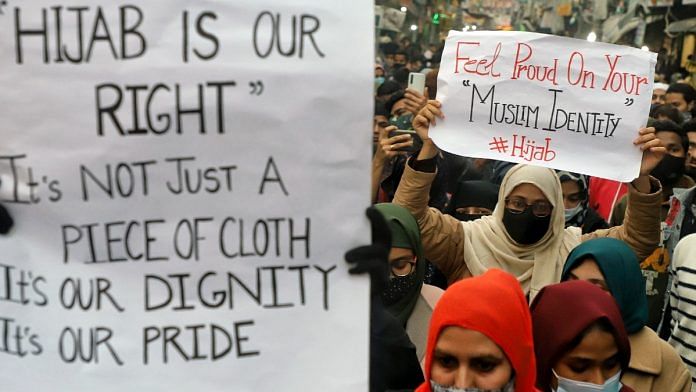New Delhi: The two Supreme Court judges who delivered a split verdict in the hijab controversy chose not to examine whether wearing the headscarf amounts to an essential religious practice (ERP) in Islam.
In their separate divergent opinions on the hijab ban, while Justice Hemant Gupta dismissed the petitions filed by Muslim girl students, Justice Sudhanshu Dhulia upheld them and quashed the Karnataka government order dated 5 February that amounted to a prohibition on the headscarf in educational institutions.
But neither elaborated on whether hijab wearing is an essential religious practice in Islam, despite the petitioners claiming it to be one. Incidentally, the Karnataka HC had in its 15 March verdict declared the ban valid on the grounds that it is not an essential religious practice.
Though both, the petitioners and the state government, put forth extensive arguments on ERP in the apex court, the bench chose not to delve into the issue.
Also Read: Discriminatory to not essential religious practice — what appellants, state told SC in hijab case
ERP test, doctrine
ERP is a doctrine developed over the years by the top court and governs which religious practices are protected under Articles 25 and 26 (fundamental rights to practice, profess, propagate religion and manage religious affairs).
However, Article 25 (2) empowers a State to notify a law to regulate any economic, financial, political or other secular activity which may be associated with religious practice to provide social welfare and reform.
The ERP test allows courts to determine which practices are essential to a religion and whether doing away with them would alter the very nature of that religion. The ERP doctrine dictates that only essential religious practices are protected from government interference.
In the apex court, the petitioners argued that wearing a headscarf is an ERP followed by Muslim women since time immemorial. It was contended that the practice has been provided for in the religious scriptures of Islam and is thus essential to the religion.
The government order, they submitted, impinged upon their right to wear a headscarf as an ERP and thus amounted to a violation of their rights under Article 25.
Some petitioners also asserted that it was not for the court to decide what constitutes an ERP.
Karnataka government, on the other hand, maintained that wearing of hijab may be a practice or an ideal or permissible practice, but not an ERP. Counsel for the state argued that more is required to be pleaded and it has to be shown that not wearing a headscarf would jeopardise the identity of a person as a believer in that faith.
‘Core beliefs, ticket to education’
After examining several top court judgements and interpretations of Quranic verses, Justice Gupta held that the ERP doctrine was developed when the State interfered with certain practices pertaining to religious places or religious festivities or performance of religious rituals in public or where such practices curtailed fundamental rights.
But in the present case, the judge observed, petitioners did not want to perform a religious activity in an institution but to wear a headscarf in a public place as a matter of social conduct, expected from believers of the faith. Here, he said, students “want to subjugate their freedom of choice of dress to be regulated by religion rather than by the State”.
He dismissed the petitioners’ attempt to draw a comparison with Sikh practices in support of their case.
The judge noted that ERP of followers of Sikh faith cannot be made basis of wearing of hijab/headscarf by believers of Islam. “Practices of each of the faiths have to be examined on the basis of tenets of that religion alone,” said Justice Gupta, without presenting a conclusive finding on ERP.
According to Justice Dhulia’s interpretation, essential religious practice test was not essential to decide this dispute and courts have over the years used this test to arrive at the conclusion that the right to religion under the Constitution would protect only ERP and not all religious practices.
Such practices, he said, include “core beliefs” upon which a religion is founded.
However, the present case was about an individual’s right to choose and it is not required for an individual to establish that the practice he or she asserts is an essential religious practice.
Justice Dhulia opined that “it may simply be any religious practice, a matter of faith or conscience”, and asserted that the test comes into play only when the court deals with cases involving “a community right” (rights of a community as a whole).
“It may or may not be a matter of essential religious practice, but it still is, a matter of conscience, belief, and expression. If she wants to wear hijab, even inside her classroom, she cannot be stopped, if it is worn as a matter of her choice, as it may be the only way her conservative family will permit her to go to school, and in those cases, her hijab is her ticket to education,” Justice Dhulia wrote.
With the two judges differing from each other on the remaining questions of law, the matter will now be placed before a three-judge bench of the apex court. Whether the larger bench will look into the ERP issue is yet to be seen.
(Edited by Amrtansh Arora)
Also Read: ‘Karnataka govt’s hijab order promotes equality’: SC judge Gupta’s opinion in split judgment



